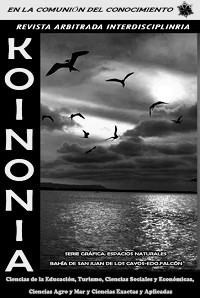Artificial intelligence in organizational management: Impact and reality in Latin America
DOI:
https://doi.org/10.35381/r.k.v8i1.2782Keywords:
Artificial intelligence, organization, organizational change, (UNESCO Thesaurus)Abstract
The general objective of the research was to describe artificial intelligence in organizational management: Impact and Latin American reality. The study was conducted from the positivist paradigm and quantitative perspective, through the recovery, compilation and critical analysis of documentary and bibliographic references, from a bibliographic design of documentary type, the researchers conducted a research process where the study population was based basically on written documents such as theses and refereed works, the content analysis of the information collected was considered, which allowed the production of results. The analytical-synthetic and inductive-deductive methods were also used. It is concluded that organizational management faces great challenges, as a result of the advance of technologies, and especially the resurgence of artificial intelligence in the different fields in which it is present, causing a process of adaptation and reengineering in the planning and execution of activities.
Downloads
References
Armas Morales, C., y Anicama Pescorán, J. (2022). ¿Inteligencia artificial un fenómeno socioeconómico? Despido del trabajador por automatización empresarial. [Artificial intelligence a socioeconomic phenomenon? Worker dismissal due to business automation]. Revista Investigación y Negocios, 15(25), 139-151. Recuperado de https://n9.cl/dq232
Banco de Desarrollo de América Latina y el Caribe. (15 de septiembre de 2021). Inteligencia artificial para modernizar los Estados de América Latina. [Artificial intelligence to modernize Latin American states]. Recuperado de https://n9.cl/uit5ea
Barrios-Tao, H., Díaz, V., y Guerra, Y. M. (2021). Propósitos de la educación frente a desarrollos de inteligencia artificial. [Educational purposes in the face of artificial intelligence developments]. Cadernos de Pesquisa, 51, e07767. https://doi.org/10.1590/198053147767
CEPAL. (2019). Cumbre de Inteligencia Artificial en América Latina. [Artificial Intelligence Summit in Latin America]. Recuperado de https://n9.cl/zdxga
Corvalán, J. (2018). Inteligencia artificial: retos, desafíos y oportunidades– Prometea: la primera inteligencia artificial de Latinoamérica al servicio de la Justicia. [Artificial intelligence: challenges and opportunities - Prometea: Latin America's first artificial intelligence at the service of Justice]. Revista de Investigações Constitucionais, Curitiba, 5(1), 295-316. https://doi.org/10.5380/rinc. v5i1.55334
Dávila Newman, G. (2006). El razonamiento inductivo y deductivo dentro del proceso investigativo en ciencias experimentales y sociales. [Inductive and deductive reasoning within the research process in experimental and social sciences]. Laurus, 12(Ext),180-205. Recuperado de https://n9.cl/nx847
Erazo-Castillo, J., y De la A-Muñoz, S. (2023). Auditoría del futuro, la prospectiva y la inteligencia artificial para anticipar riesgos en las organizaciones. [Auditing the future, foresight and artificial intelligence to anticipate risks in organizations]. Revista Digital Novasinergia, 6(1), 105-119. https://doi.org/10.37135/ns.01.11.07
García Herrera, J. (2020). Inteligencia artificial en las organizaciones. [Artificial intelligence in organizations]. Tesis de Especialización. Universidad Militar Nueva Granada. Recuperado de https://n9.cl/wm6e3y
Kantis, H., Menéndez, C., Álvarez-Martínez, P., y Federico, J. (2023). Colaboración entre grandes empresas y startups: una nueva forma de innovación abierta. [Collaboration between large companies and startups: a new form of open innovation]. Tec Empresarial, 17(1), 70-93. https://dx.doi.org/10.18845/te.v17i1.6544
Llamas Covarrubias, J., Mendoza Enríquez, O., y Graff Guerrero, M. (2022). Enfoques regulatorios para la inteligencia artificial (IA). [Regulatory approaches to artificial intelligence (AI)]. Revista chilena de derecho, 49(3), 31-62. https://dx.doi.org/10.7764/r.493.2
Ocaña-Fernández, Y., Valenzuela-Fernández, L., y Garro-Aburto, L. (2019). Inteligencia artificial y sus implicaciones en la educación superior. [Artificial intelligence and its implications for higher education]. Propósitos y Representaciones, 7(2), 536-568. https://dx.doi.org/10.20511/pyr2019.v7n2.274
Pérez González, Á., Villegas Estévez, C., Cabascango Jaramillo, M., y Soria Flores, E. (2023). Inteligencia artificial como estrategia de innovación en empresas de servicios: Una revisión bibliográfica. [Artificial intelligence as an innovation strategy in service companies: A literature review]. Revista Publicando, 10(38), 74-82. https://doi.org/10.51528/rp.vol10.id2359
Pérez León, E. V., y Rojas Arevalo, D. I. (2019). Impacto de la inteligencia artificial en las empresas con un enfoque global. [Impact of artificial intelligence on companies with a global approach]. Universidad Peruana de Ciencias Aplicadas (UPC), Lima, Perú. Recuperado de http://hdl.handle.net/10757/628123
ProFuturo y OEI. (2023). El futuro de la Inteligencia Artificial en educación en América Latina. [The future of Artificial Intelligence in education in Latin America]. Recuperado de https://n9.cl/ijbm8d
Rojas Torres, E. A., Carrasco Lino, L. C., Polanco Tintaya, A. N., y Romero Carazas, R. (2022). Pedagogías Disruptivas en Latinoamérica. [Disruptive Pedagogies in Latin America]. Horizontes. Revista de Investigación en Ciencias de la Educación,6(25), 1487–1497. https://doi.org/10.33996/revistahorizontes.v6i25.429
Ropa-Carrión, B., y Alama-Flores, M. (2022). Gestión organizacional: un análisis teórico para la acción. [Organizational management: a theoretical analysis for action]. Revista Científica de la UCSA, 9(1), 81-103. https://doi.org/10.18004/ucsa/2409-8752/2022.009.01.081
UNESCO. (2020). La ciudadanía digital como política pública en educación en América Latina. [Digital citizenship as public policy in education in Latin America]. Oficina Regional de Ciencias para América Latina y el Caribe, Montevideo. Recuperado de https://n9.cl/t3bgt
Vázquez Pita, E. (2022). La UNESCO y la gobernanza de la inteligencia artificial en un mundo globalizado. La necesidad de una nueva arquitectura legal. [UNESCO and the governance of artificial intelligence in a globalized world. The need for a new legal architecture]. Anuario de la Facultad de Derecho. Universidad de Extremadura, (37), 273-302.https://doi.org/10.17398/2695-7728.37.273
Published
How to Cite
Issue
Section
License
Copyright (c) 2023 Lino Rolando Rodríguez-Alegre, Helber Calderón-De-Los-Ríos, María Melitta Hurtado-Zamora, Ángel Willian Ocaña-Rodríguez

This work is licensed under a Creative Commons Attribution-NonCommercial-ShareAlike 4.0 International License.
CC BY-NC-SA : Esta licencia permite a los reutilizadores distribuir, remezclar, adaptar y construir sobre el material en cualquier medio o formato solo con fines no comerciales, y solo siempre y cuando se dé la atribución al creador. Si remezcla, adapta o construye sobre el material, debe licenciar el material modificado bajo términos idénticos.
OAI-PMH URL: https://fundacionkoinonia.com.ve/ojs/index.php/revistakoinonia/oai.









